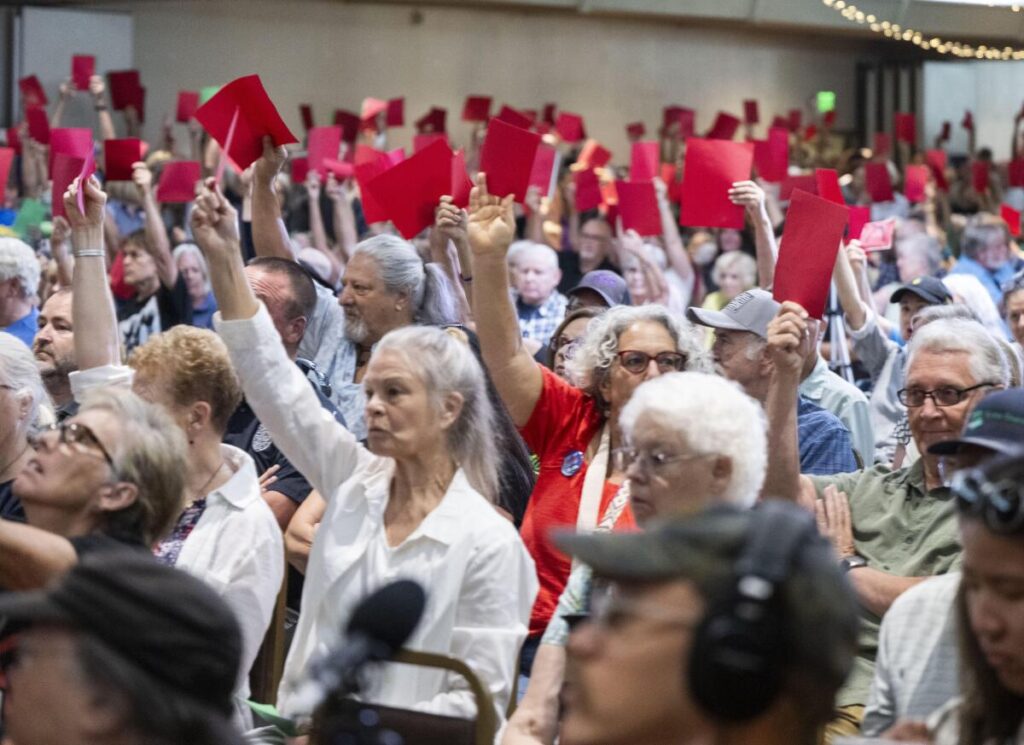What Californians think about Gov. Gavin Newsom’s plan to temporarily redraw the state’s congressional districts has been a source of hot debate.
Republicans rallied around polling conducted by Politico last week that noted that California voters preferred an “independent line-drawing panel” determining seats to the House of Representatives versus giving that role to the state Legislature.
Newsletter
You’re reading the Essential California newsletter
Our reporters guide you through the most important news, features and recommendations of the day.
You may occasionally receive promotional content from the Los Angeles Times.
New polling, however, suggests more voters may now be backing the governor than stand opposed, with a large contingent undecided, according to reporting from my colleagues Melody Gutierrez and Laura J. Nelson.
Let’s jump into what the numbers say.
Why is Newsom considering redistricting?
The high-stakes fight over political boundaries could shape control of the U.S. House, where Republicans currently hold a narrow majority.
Texas’ plan creates five new Republican-leaning seats that could secure the GOP’s House majority. Texas is creating the new districts at the behest of President Trump to help Republicans keep control of the House in the midterm elections. California’s efforts are an attempt to temporarily cancel those gains. The new maps would be in place for the 2026, 2028 and 2030 congressional elections.
Newsom and Democratic leaders say California must match Texas’ partisan mapmaking to preserve balance in Congress.
New polling supports Californians fighting back
The UC Berkeley Institute of Governmental Studies poll, conducted for the Los Angeles Times, asked registered voters about the Newsom-backed redistricting push favoring California Democrats. This effort serves as a counterattack to President Trump and Texas Republicans reworking election maps to their advantage.
When voters were asked whether they agree with California’s redistricting maneuver, 46% said it was a good idea, and 36% said it was a bad idea.
Slightly more, 48%, said they would vote in favor of the temporary gerrymandering efforts if it appeared on the statewide special election ballot in November. Nearly a third said they would vote no, and 20% said they were undecided.
One interpretation of the data
“That’s not bad news,” said Mark DiCamillo, director of the Berkeley IGS Poll. “It could be better.”
DiCamillo added: “With ballot measures, you’d like to be comfortably above 50% because you got to get people to vote yes and when people are undecided or don’t know enough about initiatives, they tend to vote no just because it’s the safer vote.”
The strongest backers
Among voters who regularly cast ballots in statewide elections, overall support for redistricting jumped to 55%, compared with 34% opposed.
DiCamillo said that is significant.
“If I were to pick one subgroup where you would want to have an advantage, it would be that one,” he said.
Where to find the undecided votes
Winning in November, however, will require pushing undecided voters to back the redistricting plan.
Among Latino, Black and Asian voters, nearly 30% said they have yet to decide how they would vote on redistricting.
Women also have higher rates of being undecided compared with men, at 25% to 14%.
Younger voters are also more likely to be on the fence, with nearly a third of 18- to 29-year-olds saying they are unsure, compared with 11% of those older than 65.
The ever-growing divide
The partisan fight over election maps elicited deeply partisan results.
Nearly 7 in 10 Democratic voters said they would support the redistricting measure, and Republicans overwhelmingly panned the plan by about the same margin (72%).
Former President Obama endorsed it, and California’s former Gov. Arnold Schwarzenegger, a moderate Republican, told the New York Times he would fight it.
The effort faced opposition this week in Sacramento during legislative hearings, where Republicans blasted it as a partisan game-playing.
California Republicans attempted to stall the process by filing an emergency petition at the state Supreme Court, arguing that Democrats violated the California Constitution by rushing the proposal through the Legislature.
The high court rejected the legal challenge Wednesday.
We’ll be following along and providing updates until election day. For now, check out the full article.
The week’s biggest stories
Gavin Newsom’s policies and reactions
Crime, courts and policing
Entertainment news
Amazing animal tales
More big stories
This week’s must-reads
More great reads
For your weekend
Going out
Staying in
Have a great weekend, from the Essential California team
Jim Rainey, staff writer
Kevinisha Walker, multiplatform editor
Andrew J. Campa, reporter
Karim Doumar, head of newsletters
Diamy Wang, homepage intern
Izzy Nunes, audience intern
How can we make this newsletter more useful? Send comments to essentialcalifornia@latimes.com. Check our top stories, topics and the latest articles on latimes.com.
